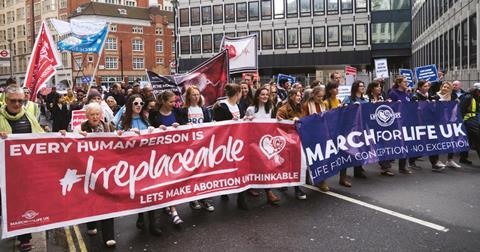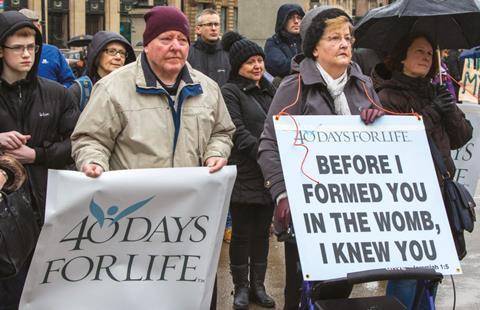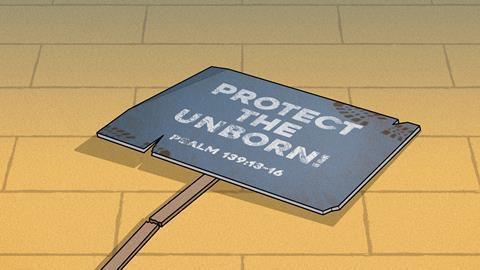Activists say most churches are silent on pro-life issues. Heather Tomlinson asks if Christians are avoiding the subject and, if so, why?
Before I had any significant contact with the Church, I thought I knew exactly what it believed about abortion. Somehow I had picked up the idea that Christians were pro-life, and that they really, really cared about the issue. So it’s with some surprise that after 15 years of faith, during which I have regularly attended church and been to many Christian events, I can recall very few mentions of the subject.
There has been little to inspire me out of what is, admittedly, my own personal apathy, despite seeing a friend in distress after an abortion. I have occasionally heard a message of mercy and forgiveness for women who have had abortions, and once or twice heard support for Christian pregnancy counselling charities. There was the occasional email mentioning upcoming abortion legislation with a petition or request to write to an MP. Apart from that, nothing. No sermons on why abortion is wrong, or encouragement to take up the pro-life cause. I can’t remember any large Christian festival taking it on, though plenty of other social justice issues are covered.
It’s an observation confirmed by others. “While Christian parachurch groups like CARE, Christian Concern and Christian Institute are active in addressing it, the issue is seldom addressed in churches, and in many, not at all,” argues Dr Peter Saunders, head of the International Christian Medical and Dental Association and a long-standing pro-lifer during a 27 year career at the Christian Medical Fellowship. John Deighan, chief executive designate of the Society for the Protection of the Unborn Child, agrees. He says the Church is “too reticent to speak…many lives are being damaged as a result”.
Though hard data is sparse, an Evangelical Alliance survey in 2015 found that only 21 per cent of evangelicals had heard abortion publicly talked about in their church in that year – compared to 66 per cent for poverty, and 50 per cent for human trafficking.
“One of the things that Jesus taught us is that our actions are a good measure of whether we care about something,” says Dr Calum Miller, a medical doctor, ethicist and Christian philosopher. “By that measure, the UK Church by and large does not care about abortion.”
We aren’t even managing to convince ourselves to be pro-life, let alone others
With more than 200,000 terminations in this country in 2020 – and rising every year – activists think it should be the Church’s top priority. Access increased during the pandemic with the introduction of ‘home abortions’. A woman can now talk to a doctor over the phone and get abortion pills sent to her home. Among other ethical issues, there are fewer checks to prevent coercion and less access to counselling or other support services.
“Most of our clients tell us that they are asked [by an abortion provider] if they are sure it’s what they want to do,” says Judy McGibbon, who runs the Pregnancy Centres Network (PCN), a group of Christian counselling charities. “If they say yes, then no more questions are asked. We have many anecdotes of women saying: ‘I said yes, but inside I was sobbing my heart out.’”
There are individual Christians who care about abortion. They write to this publication, and ask their churches to do more. Last month an attempt by Diana Johnson MP to legalise abortion up to birth prompted thousands to write to their MP – she backed down.
Some feel guilt and regret for their own involvement in a termination. Certain churches and individuals are praised by activists, such as evangelist J. John, Rev Vaughan Roberts, rector of Oxford’s St Ebbe’s, and Rt Rev Dr Rowan Williams, former Archbishop of Canterbury. The Roman Catholic Church is considered more vocal on the issue too. But, by and large, pro-life campaigners believe church leaders avoid the issue. Every pro-life group bar one told me that the Church’s response is weak. Certainly, in researching this article, few of the usually chatty ‘talking heads’ of the UK Church would comment. The same leaders who quickly responded to requests for comment on anything from poverty to politics were silent when I asked for their views on abortion.
CONSEQUENCES
The Church’s silence was blamed for the recent legislation to expand abortion access in Northern Ireland. This was controversially imposed while the region’s own power structures were temporarily suspended.
“Westminster was able to do what they did in the summer of 2019 because, for over 40 years, the majority of the Church in Great Britain has been silent on the issue,” says Dawn McAvoy, an Evangelical Alliance researcher in Northern Ireland, who runs the award-winning pro-life Both Lives Matter campaign. “That silence contributed to the continued normalising of abortion there and the disrespect and overt distaste for the law and culture here in Northern Ireland.”
She says the Church in Great Britain “seems broadly to have lost the centrality of the doctrine of being made in the image of God when it comes to the unborn child”.
“When it comes to abortion, UK evangelicalism is not working,” says Dave Brennan of Brephos, one of the most forceful voices on the subject in the UK. Writing on his blog, Brennan added, “Not even in proportion with its small size. Not even internally. We aren’t even managing to convince ourselves to be pro-life, let alone others. Pro-choice ideology is dominating within the Church.”

SOCIAL JUSTICE
There was a time when this apparent apathy might have been blamed on a lack of interest in Christian ethics, but no longer. Today, poverty, climate change, women’s rights and racism are regularly addressed in the pulpit. Anglican bishops led a rebellion against a cap on benefits and are very vocal on many social issues. Yet they were almost silent during the Northern Ireland abortion debate.
Advocates of social justice rarely seem to take on the cause. Pro-life activists say they have tried to get the Justice Conference, hosted by Tearfund in the UK, to discuss abortion, but were told it was too controversial. A spokesperson told Premier Christianity the event gets requests to cover many injustices and “cannot accommodate them all”.
The Christian festival Greenbelt lists ‘justice’ among its concerns. A search on their website finds pages of talks and other content for ‘poverty’. Yet for ‘abortion’ there are only two mentions; one refers to a speaker who had previously taken pro-life action, though her talk wasn’t on that subject. The other was a punk band publicising a charity that actually helps women to access abortion.
Are Christians pro-life?
It’s often assumed Christians are against abortion. But does the evidence back up that idea?
- When the 1967 abortion act was being debated, the CofE wrote a report, Abortion - an ethical discussion, that effectively gave the moral green light for the legislation to pass. “For the first time, an authoritative body within the CofE agreed that abortion could be legalised,” said theologian Canon Robin Gill, in the Church Times.
- When legislation to introduce abortion to Northern Ireland was debated in the House of Lords in 2020, only seven of the 26 Anglican bishops voted against it.
- Only 37 per cent of respondents in the Evangelical Alliance’s 21st Century Evangelicals survey said they believe abortion can never be justified.
- Appearing in a TV interview in 2019, Archbishop of Canterbury, Most Rev Justin Welby, supported the concept of ‘buffer zones’ to make prayer vigils outside abortion clinics illegal. Campaigners say their purpose is to be present in case women want to seek help to have their baby - the website behereforme.org has stories of women who are grateful they continued with pregnancy after talking to someone at a vigil.
- Even the most conservative of the large denominations, the Fellowship of Independent Evangelical Churches, has been criticised by pro-life campaigners for a lukewarm attitude to abortion, as has St Helen’s Bishopsgate, one of the most influential conservative evangelical churches in the UK.
WHY SO QUIET?
David Stroud, senior leader at Christ Church London, says the UK Church “does care” about abortion. “But I think there are a whole set of obstacles in their way to do more about it. If some of the obstacles were removed and there was a sense that there would be a genuine step forward on the issue, I think you would find there was a lot of energy. At the moment it’s like a football team that’s three-nil down.”
There are numerous reasons why church leaders might be reticent to take on the pro-life cause. I asked campaigners to respond to some of the most common objections:
Preaching on abortion could hurt women in the congregation
“Christians, and particularly church leaders, are rightly sensitive to the reality that many people in our churches have had abortions or are close to people who have,” says Andrea Williams, who runs the boldly pro-life Christian Concern.
She says this worry is best addressed by talking about it well, rather than avoiding the subject. “Silence suggests that abortion is either so trivial that it doesn’t bear mentioning, or so heinous that there can be no forgiveness. This isn’t truly compassionate – we need to understand that abortion is a great wrong, yet God offers complete forgiveness to all who seek it.”
Dr Miller says he has never had any negative feedback from his talks in church, including from people who’ve had abortions: “We know it can be preached about in a sensitive and healing way. Usually they are glad because this thing they’ve been confused or hurt by for so many years receives clarity and a voice, and those are the first steps towards healing.”
Christians spend too much time condemning abortion and not enough time supporting pregnant mothers and single parents, doing other kinds of social work, or addressing other life issues such as the death penalty
Campaigners respond that many churches do have a holistic concern for all of life. Even if not, such “whataboutery” doesn’t make a case for inaction. Mark Bhagwandin at Life, a charity that runs support services for women with unplanned pregnancies, believes that sermons should both be clear that abortion is wrong, and encourage support for women who are desperate. “If the congregation only sees advocacy for the unborn baby and not for women in crisis, that message of support and hope through turbulent times will not get across easily,” he says. “Emphasise support for women in crisis pregnancies, and work with charities like ours in terms of ensuring women are aware of the opportunities that are there to get practical support, housing…in that way they are actually helping mothers.”

It’s a lost cause – the secular culture is so pro-abortion that there’s no point in tackling it until more people become Christians
John Stevens, national director of the Fellowship of Independent Evangelical Churches (FIEC), wrote on his blog that outlawing abortion could only come after widespread conversion to Christ: “The cultural acceptance of abortion and the ideologies that underlie [it] are so deep and widely shared that a fundamental change in worldview on the part of the majority of the population is required…most likely to be the result of the progress of the gospel.”
He argues that though Christians ultimately put an end to the evils of the slave trade, this followed a powerful revival, and a change in public attitudes.
Brennan counters that Wilberforce was widely hated at the start of his campaign. So was John Wesley during the revival. What if they had waited until public opinion changed before they started their work?
In any case, is abortion really a lost cause? Today’s campaigners are hopeful when considering recent examples of cultural shifts, despite secular and atheistic attitudes. “We could have said the same about the transgender subject, but now that’s become a woman’s issue, and there are all sorts of people saying we have questions about this,” pointed out one pastor. “In the same way there are opportunities. The logic of the argument [against abortion] is very strong.”
The pro-life case has been strengthened in recent years by more knowledge of the gruesome details of late-term abortions – along with many shocking pictures and videos. Former employees of the abortion industry have also come forward to discuss unsavoury practices and attitudes in some providers.
There’s even a suggestion that as veganism is in the ascendency (with many vegans considering killing a prawn in the sea unethical) it could become easier to persuade society that a tiny foetus has value. Certainly if the Church of today saw abortion as important as the slavery campaign of the 18th and 19th Centuries, then more progress could be made.
We don’t want to be know for what we’re against - we want people (and especially women) to know we love them
One subtle way the Church has acted on this issue in recent years is offering pregnancy advice and counselling. The small charities of the PCN are usually supported or founded by local churches. They offer information and support, and discuss worries such as finances or singleness. “Yes, there is a place for presenting the case against abortion and trying to change the public’s minds, but that is not what we at PCN are called to do,” says McGibbon, the network’s director.
“Churches very seldom talk about abortion…I would love to see a culture in which it is talked about in a graceful and compassionate way. It is not talked about so much because there are such strong polarisations. The concern is that it will come across in a judgemental way.”
Many women who have had abortions do want compassionate – but clear – teaching in churches. “It seems to me disingenuous to claim you care for women who’ve had abortions if you did nothing to try and make sure they didn’t end up in that place to begin with, by warning them of the realities and teaching the Church to help women avoid that situation,” says Brennan.
Making abortion illegal just forces it underground. It wouldn’t stop, just become more dangerous for women
It’s argued that pro-choice campaigners overestimated the problem of illegal abortions prior to 1967. “Although backstreet abortion was a public health problem, there is a serious question as to whether overhauling the law was a proportionate response,” says Naomi Marsden in a detailed report on the subject for CARE.
UK statistics show that in 1967, when abortion was legalised, there were five abortions for every 1,000 women of childbearing age. In 2019, there were 18.
'Churches need to talk about abortion more’

Natalia, 21, from Bristol, found out she was pregnant in March 2020, just before lockdown. She took abortion pills at home, despite serious doubts. She now regrets the choice and wants churches to teach more about abortion and publicise the support available for women in her situation
The abortion clinic gave me pills to take home, because I was perceived as too upset to take them there and then. I held onto them for two to three weeks, because I didn’t want an abortion. I felt almost forced into this decision. From taking the first pill, I thought there was no turning back: I had no idea about any reversal pill until months later.
I already had some religious faith, though I wasn’t practising at the time. I wasn’t in the right mental state to reach out to anyone for help. I felt so alone and isolated. I convinced myself I wasn’t capable of having a child on my own. I had no positive support at all then, so if someone had been praying outside of the abortion centre and had offered me support, I think I would have accepted it.
I believe churches need to talk about this more. I haven’t ever experienced judgement in a church. Priests need to tell women about the support that they have if they fall pregnant. I’d never heard of charities [like Good Counsel Network and Life] that can help women.
They also need to say to women who’ve had abortions that there is Christian help out there. You’re not left alone.
Healing is a process. I went to Rachel’s Vineyard in October. On that retreat I started to heal. I started going back to church. Now I feel like there is a lot more hope. It’s still really tough, but I’m able to understand it better.
I have my own view on abortion. But I don’t want to force it on others
This position is held by Rt Rev Dame Sarah Mullally, the Bishop of London, a former midwife, who wrote in a blog post: “I would describe my approach to this issue as pro choice rather than pro live [sic] although if it were a continuum I would be somewhere along it moving towards pro-life when it relates to my choice and then enabling choice when it related to others.”
The US Republican politician Ben Carson once held a similar view. But he recently told EWTN that he changed his mind and became “pro-life” when he reflected on what might have happened if American anti-slavery campaigners had the same attitude. Would it still exist in the US today?
Taking a stance on abortion could attract controversy and bad publicity, which could turn people off the gospel
Today, some pro-choice women speak proudly about having an abortion, say that they are not ashamed and do not regret it. They could react strongly to any clear teaching that it is wrong, especially if they have not heard it before.
But is the idea that we shouldn’t offend biblical? “Jesus and the apostles didn’t avoid controversy for fear of ‘putting people off the gospel’,” says Brennan. “Jesus talked to the rich man about his money, the woman at the well about her affairs, the two brothers fighting over their inheritance about greed. Is it a modern, Western invention that we are to avoid controversy in order to preach the gospel faithfully?”
Violent protests outside pro-life churches have taken place across the world. In the UK, when St Wilfred’s in York started a “40 days for life” campaign last year, it hit the local news, and protesters gathered outside the church on Sundays. This has not stopped them planning another campaign. But as a traditionalist Catholic church that celebrates the Latin Mass, it is perhaps less concerned about appeasing modern fashions than most.
If a church faces antagonism, it could be seen as an opportunity to demonstrate Christ’s love. The protesters outside St Wilfred’s were apparently offered cups of tea by the parishioners. As John 1:17 says, Jesus brought both “grace and truth…into being” (CEB). The Church will need both if it is to finally start to talk about abortion.






































